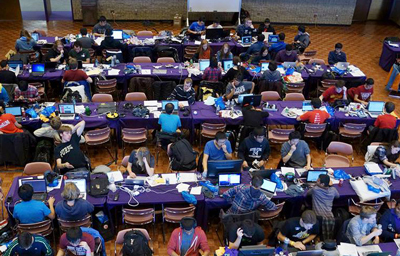Wildhacks, Northwestern’s Largest Intercollegiate Hackathon, Hits Campus
The event had 413 participants from across the United States
This past weekend, 413 college students from across the United States piled into the Norris University Center and hacked the night away.
The 24-hour Wildhacks hackathon marked Northwestern’s largest intercollegiate hackathon to date. Open to students from all colleges and universities, the event challenged teams to create web, desktop, and mobile computer projects.
“We didn’t offer a prompt or any restrictions,” said Suzee Han (WCAS ’15), a member of the Wildhacks planning committee. “We just wanted people to build whatever they felt passionate about—something that inspired them to work all night.”
 Organized by HackNorthwestern and EPIC, an entrepreneurial student group sponsored by the Farley Center for Entrepreneurship and Innovation, the first annual Wildhacks took place Nov. 22-23 and was completely free of charge. Major sponsors included Ford, IBM, and Major League Hacking, which each sent personnel to mentor the student participants and help troubleshoot problems.
Organized by HackNorthwestern and EPIC, an entrepreneurial student group sponsored by the Farley Center for Entrepreneurship and Innovation, the first annual Wildhacks took place Nov. 22-23 and was completely free of charge. Major sponsors included Ford, IBM, and Major League Hacking, which each sent personnel to mentor the student participants and help troubleshoot problems.
Michael Marasco, director of the Farley Center, attended the event on both days and was inspired by the spirited collaborations. “To see more than 400 students from Northwestern and other institutions together in Norris was beyond my expectations,” he said. “Seeing students work in small teams but also collaborate across teams was very special. Wildhacks helped propel EPIC to a premier student group on campus.”
As expected, many participants were computer science or computer engineering students, but several other disciplines were also represented. “We had both beginners and more experienced hackers,” said Han, who is a pre-med major. “It inspired me to learn more about programming.”
Northwestern claimed 130 of the participants; many others visited from Purdue University, University of Wisconsin, University of Michigan, and University of Illinois at Urbana-Champaign. The farthest traveled student flew in from Johns Hopkins University in Baltimore, and several McCormick alumni currently living in California attended to serve as mentors.
At the end of the event, 86 teams submitted projects, which judges scored based on four criteria: originality, technicality, design, and usefulness. Northwestern’s Michael Wang took first place with his app “BikeSight.” The app uses a Myo armband to sense hand gestures, which operate light-up icons on the biker’s helmet to improve visibility and safety. Second place went to “Regex Adventures,” developed by another Northwestern team comprising Nathan Yeazel, Daniel Rasmuson, and Alex Kowalczuk. The program teaches computer language through an interactive online game. Purdue’s Marty Kausas took third for “WaveWatcher,” a pebble watchface that displays tide information at nearby beaches.
“The goal of Wildhacks wasn’t to try to build the next Facebook or anything but to promote hacking culture,” Han said. “We wanted to connect hackers with each other and give them the time and resources to do what they love.”